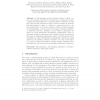Free Online Productivity Tools
i2Speak
i2Symbol
i2OCR
iTex2Img
iWeb2Print
iWeb2Shot
i2Type
iPdf2Split
iPdf2Merge
i2Bopomofo
i2Arabic
i2Style
i2Image
i2PDF
iLatex2Rtf
Sci2ools
ATAL
2003
Springer
2003
Springer
Self-Organisation: Paradigms and Applications
Abstract. A self-organising system functions without central control, and through contextual local interactions. Components achieve a simple task individually, but a complex collective behaviour emerges from their mutual interactions. Such a system modifies its structure and functionality to adapt to changes to requirements and to the environment based on previous experience. Nature provides examples of self-organisation, such as ants food foraging, molecules formation, or antibodies detection. Similarly, current software applications are driven by social interactions (negotiations, transactions), based on autonomous entities or agents, and run in highly dynamic environments. The issue of engineering applications, based on the principles of selforganisation to achieve robustness and adaptability, is gaining increasing interest in the software research community. The aim of this paper is to survey natural and artificial complex systems exhibiting emergent behaviour, and to outline the...
Related Content
| Added | 06 Jul 2010 |
| Updated | 06 Jul 2010 |
| Type | Conference |
| Year | 2003 |
| Where | ATAL |
| Authors | Giovanna Di Marzo Serugendo, Noria Foukia, Salima Hassas, Anthony Karageorgos, Soraya Kouadri Mostéfaoui, Omer F. Rana, Mihaela Ulieru, Paul Valckenaers, Chris van Aart |
Comments (0)

